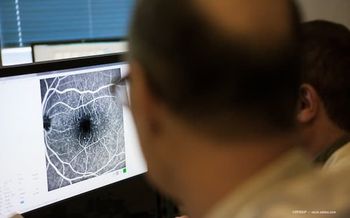
ASRS 2023: Michael Singer, MD, provides details on the Starlight Study for Stargardt disease
At the 2023 ASRS annual meeting in Seattle, Washington, Michael Singer, MD, spoke with our team about the Starlight Study, which is an optogenetic study looking at patients who had Stargardt disease.
At the 2023 ASRS annual meeting in Seattle, Washington, Michael Singer, MD, spoke with our team about the Starlight Study, which is an optogenetic study looking at patients who had Stargardt disease.
Video Transcript
Editor's note - This transcript has been edited for clarity.
Michael Singer, MD:
Hello, my name is Michael Singer from Medical Center Ophthalmology Associates in San Antonio. Today I want to talk about a presentation that was given at ASRS. It's called, "The Starlight Study." The Starlight Study was an optogenetic study looking at patients who had Stargardt's disease. MCO 10, a multi chromatic opsin [that] is Gene agnostic, was given by individual injection to six different patients. What's interesting to know is these patients essentially had very relatively poor vision.
Although they were all ABCA4 Positive, those who had macular disease saw significant improvements in terms of their visual field, full questionnaires, and visual acuity. What's really interesting [is] although it's a small, proof-of-concept study, it's very good to know these patients, who had no other forms of therapy, may have some possibilities to be able to see a little bit better with this type of technology. This could be a huge game changer because a lot of these people right now have no hope, and this is the start of a new therapy that may give them hope. We see lots of these patients who, due to their inherited retinal diseases, need significant visual assistance or can be relatively depressed and they've been asking us forever what we can do. This is the first step, hopefully, to give these patients hope to start restoring their vision and increasing their quality of life.
The next step is a trial [currently] going on in patients with retinitis pigmentosa, which Phase 2 has been completed. In addition, for this group of patients, it will be expanded over time. Lessons will be learned because this is a 6 month study and there'll be 6 months of safety follow up. Assuming the safety signals are good, I think they'll expand that to a larger population.
Newsletter
Keep your retina practice on the forefront—subscribe for expert analysis and emerging trends in retinal disease management.




























